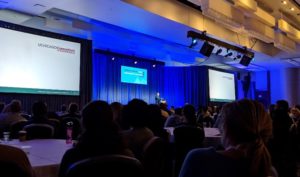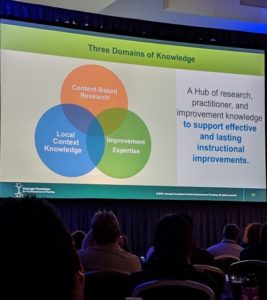What Works for Whom, When, and Under What Conditions?: NYKids attends the Carnegie Foundation Summit to Enhance Use of Improvement Science in New York State
The NYKids team attended the sixth annual Carnegie Foundation Summit hosted by the Carnegie Foundation for the Advancement of Teaching. The Summit brings together practicing K-12 and post-secondary educators, researchers, policymakers and others to focus on improving educational outcomes.
Improvement Science

The Carnegie Foundation works to address educational inequities by leveraging networks of educators, researchers and others focused on using improvement science principles. Improvement science advocates for the use of cycles of inquiry (i.e. plan-do-study-act) to determine what works for whom, when, and under what conditions.
Connection to NYKids’ COMPASS-AIM Professional Development
COMPASS~AIM is based on improvement science and stands for a multi-step process to address a problem of practice. Teams compare their practices to ones in odds-beating schools (COMP), assess their priorities (A), select levers to improve (S), and set SMART goals (S). Once goals have been set, the participants take AIM at action planning (A), implementation (I) and monitoring (M) of progress toward meeting student outcome goals. The foundation for this process are case studies, frameworks, and searchable database that are all publicly available. Read more about NYKids COMPASS-AIM summer institutes for 2019, here.
Three Domains of Knowledge

NYKids efforts to help educators learn from other educators in New York State resonates with themes Anthony Bryk, President of the Carnegie Foundation for the Advancement of Teaching, discussed in his keynote address at the Summit. Bryk drew on his body of work in two books, Organizing Schools for Improvement and Learning to Improve, as well as recent work by the Carnegie Foundation.
Bryk emphasized that continuous improvement in education is brought about by practicing professionals, researchers, and improvement scientists generating and using a powerful combination of three domains of knowledge:
- Content-based research
- Local content knowledge
- Improvement expertise
It is this combination that powers the work of NYKids as teams from the University at Albany employ research on the approaches and practices of educators who have achieved better than expected outcomes (“odds-beaters”) then use that research in Network Improvement Communities (NICs) via COMPASS-AIM.
Lessons from Spotlight Organizations
During his address, Bryk showcased “spotlight” organizations. Similar to “odds-beaters” these are organizations from around the country that are making strides in improving student outcomes. Bryk found that these organizations share seven practices in common:
- Operationalizing a small number of specific instructional goals.
- Identifying causal connections and a working theory of improvement.
- Developing measures to guide improvement efforts.
- Wondering, “How have we got it right?”
- Focusing on variation in performance.
- Aligning the work of all who are involved.
- Organizing a hub to sustain networked social learning.
These lessons offer educators points for reflection in their own work. Learn more about the work at the Carnegie Foundation’s website, here.
